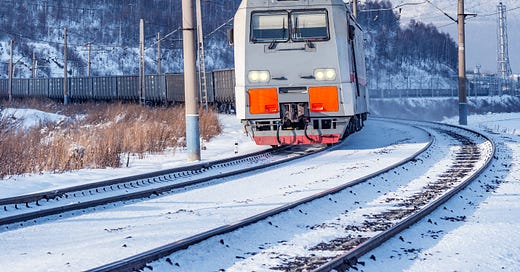A perspective on train drivers' strike in Germany
If train drivers go on strike, the transportation world comes to halt and trucks step in to fill the gap.
At least, that’s a common theory. Okay, we need to admit that we have also been affected by the strike and had to search for an alternative mode of transport for our travels to our head office in Ulm at the last minute. Eventually, we found a car. But can we simply apply this to the world of freight transportation? Or are other factors at play that influence and mitigate the impact?
Other than for high-speed passenger trains, Deutsche Bahn (DB) has no de-facto monopoly on freight trains. In fact, their share in rail freight traffic decreased over the years’ and concluded 2022 at 42%. If we further dive into this, combine it with our market observations and thereby discard mass goods rail transportation as well as single wagon transport – we end up with intermodal traffic as the most used rail freight segment throughout the majority of shippers. As only DB train drivers were called on strike, all other companies offering rail freight services continued to deliver their services. Probably even at higher quality and schedule reliability thanks to less overall traffic during the strike period. So, we can assume that intermodal traffic (low market share of DB for traction and dominant segment of rail usage for majority of shippers) was only partly affected and therefore many shippers haven’t experienced any disturbances within their supply- and transport chains at all.
This can also be confirmed by live platform road data on Transporeon, resulting in completely normal levels of rejections, and on the spot market an even higher number of offers and decreasing spot rates for transports within the week of the strike. No KPI showed thereby a typical impact of the strike like increased road traffic or demand for trucks.
So, what happened then?
No doubt, there are companies and industries affected more, in single cases also more serious if they don’t receive supplies for a full week. But for mitigation, is it simply possible to switch at short notice from train to road? No, unfortunately not, as mass goods trains are at heavyweight and a high number of special equipment trucks (>50) would be needed to replace a single train, next to all the logistics related to loading/transshipment/unloading. So, at the end the only practical solution left is to stop and pause already running trains, reschedule not yet started and resume operations after the strike is over.
This situation resembles the red sea disturbances and similar conclusions can be derived. Main mitigation possibilities like in the ocean market are increased stock levels and overall, more balanced supply chains regarding their dependency to a single player/mode/country etc.. Easier said than done. The sweet spot is here again in the right mix of efficiency and diversity within supply chains to not get hurt by the own implemented efficiency and dependency.
What to expect:
Even if the parties are not able to reach an agreement until March 3, and after this date strikes again endanger people's patience, we will most likely see no direct effects on the road transport market.





